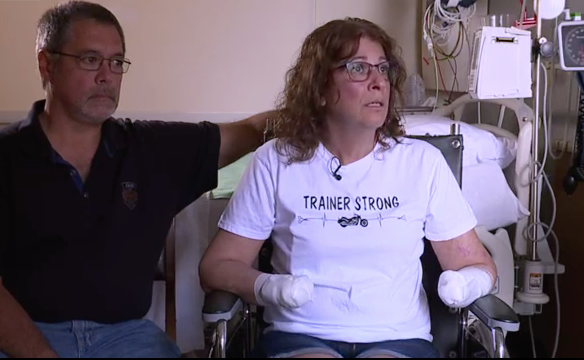Woman's arms and legs amputated due to infection from dog saliva

A woman in Ohio had to have both of her hands and legs amputated after acquiring an infection from her dog’s saliva—likely after one of her beloved pets licked her.
Marie Trainer told Fox 8 News that the start of her dreadful ordeal was when she and her husband returned from a Caribbean holiday earlier this year.
She thought she had the flu when she began experiencing nausea and back pain, but when her temperature began to fluctuate, she went to Aultman Hospital.
There, things quickly got worse. Within hours, she developed sepsis, the body’s extreme response to an infection, a life-threatening medical emergency.
READ MORE: Mum issues warning after baby son loses his limbs
As her limbs began to deteriorate because of gangrene, doctors placed Trainer in a medically induced coma, which lasted 10 days.
“When I opened my eyes, I didn’t know where I was,” Trainer said. “Then I found out everything….It was very hard to find out that they had to remove my legs and my arms… very hard to cope with,” she said, fighting back tears.
Trainer spent a total of 80 days in hospital. To her shock, blood tests revealed she had contracted an infection from the Capnocytophaga bacteria.

The bacteria live in the mouths of dogs, cats and humans. Her doctors suspect that one of her dogs may have licked a small scratch on her arm, leading to blood clots that triggered gangrene, or tissue death.
Although doctors removed as many blood clots as possible to save her life, it was too late to save her limbs.
Normal strains of human Capnocytophaga naturally live in the mouth and are part of the normal oral flora, explains Dr. Sumon Chakrabarti, specialist in infectious diseases & tropical medicine at Trillium Health Partners in Mississauga.
“Humans can also be exposed to animal versions of the bacterium through contact with saliva from cats or dogs,” Chakrabarti says. “This can be from a bite, lick, or scratch, from usually a dog. Most forms of Capnocytophaga from animals' mouths do not cause illness in humans, and most people with normal immune systems do not get ill with exposure.”
READ MORE: Lyme disease cases 'threefold higher than previously estimated'
Chakrabarti stresses that capnocytophaga usually cause major infections only in people who have specific health issues, such as advanced liver disease, asplenia (not having a spleen), functional asplenia (having a spleen that doesn’t function properly), or heavy alcohol consumption.
People with a weakened immune system, such as those with cancer or HIV, are also at greater risk of becoming ill, according to the Centers for Disease Control and Prevention.

“Individuals with any of these health issues are at risk of invasive infection,” Chakrabarti says. “Most commonly, it causes an overwhelming sepsis which can kill within hours to days of exposure. Many other forms of infection have been described including skin abscesses, pneumonia, and even meningitis, just to name a few.”
An infection can also cause endocarditis (inflammation of the lining of the heart); abscesses various body tissues; and inflammation of the eyes, face, and lymph nodes, the CDC reports.
Signs of Capnocytophaga include blisters around a cat- or dog-bite wound within hours of being bitten; redness, swelling, pus, or pain at the bite wound; fever; diarrhea, stomach pain, or vomiting; headache and/or confusion; and muscle or joint pain.
Most people who become ill will show symptoms within three to five days of being bitten, but this can range anywhere from one day to two weeks.
READ MORE: Dog ‘bites man and puppy’ inside Pets At Home superstore
About three in 10 people who develop a severe infection die. Infections that result in sepsis can and lead to death within 24 to 72 hours after symptoms start.
The CDC recommends washing a bite right away with soap and water.
The best way to avoid infection is to avoid bites, scratches, and licks from cats and dogs, Chakrabarti says. He advises patients who don’t have a working spleen to avoid close contact with those animals. If someone with a predisposing health condition does get bitten by a cat or dog, he generally prescribes a short course of antibiotics to prevent infection.
“As an infectious diseases doctor, I recommend people not let any animal lick them, but that's just me,” he cautions.
“It's important to remember this is an extremely rare condition that affects people with certain health conditions. If you don’t have one of aforementioned problems, you can continue to let your dog or cat lick you with little to no risk of serious problems.”



